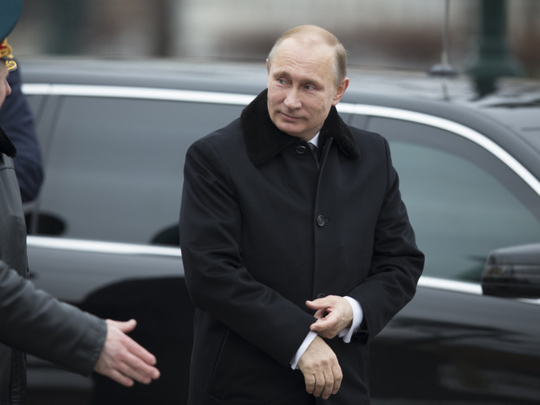
Last week, I delivered a lecture at Lodz University in Poland. I spoke about global security, Russia, Daesh (Islamic State of Iraq and the Levant), the Arab spring and the economic insecurity resulting from the latest euro crisis. In the following hour of questions and answers, only three were about a subject other than Russia and Ukraine. Viewed from Poland, the threat from Putin looks very different. For the West, the Cold War was a great triumph of ideas and economic systems over the intellectual bankruptcy of Communism.
For many Russians, this was not how it seemed. There was no fall of Berlin. In fact, in many ways, it was much more how the end of the First World War felt to many Germans, with years of economic hardship being presented as punishment by unsympathetic, if not vindictive, western powers. As sanctions were being applied to Russia following the annexation of Crimea, Putin even went so far as to tell the Germans that great powers should not be humbled, and that the Germans should understand this. It was the clearest evidence yet of Putin’s mindset.
Let us be clear about what is happening. Russia has a clear strategic plan which is to create and hold zones of potential destabilisation where it matters most for European security. As well as having Kaliningrad in the Baltic, there has been a steady campaign to intimidate its smaller neighbours and to finance political candidates sympathetic to Moscow. In the South Caucasus, not only does Russia have an occupying force on sovereign Georgian territory, but it has now created a virtual client state in Armenia.
In the Balkans, the encouragement of Republica Srpska to see the illegal secession referendum in Crimea as a precedent, risks further destabilisation in this most volatile region. Then, of course, we have the annexation of Crimea itself by force, Russia’s boldest move so far. None of this is an accident, but part of a well thought out and strategy. What are the options available for Nato and the West?
The first would be to be in denial about Russian involvement in eastern Ukraine and accept Putin’s assertions that it is nothing to do with him or his military forces. This would comfort those who worry about “a more strident” response by Moscow to any meaningful international action. The second would be to accept the reality of the Russian involvement, but to look the other way, in the hope that it would be the limit of his ambitions. This is appeasement.
The third would be to augment the current response by a further round of sanctions, increasing the pressure on the Russian economy. It is clear, however, that some European nations fear further domestic pain and it is unclear whether Putin cares about the suffering of the Russian people. The fourth option would be to give the Ukrainians the capabilities they most require in order to defend themselves against the military superiority of the pro-Russian separatists and their Kremlin allies.
Primarily, this would involve properly encrypted communications, UAVs for surveillance and anti-tank capabilities. There is increasing scepticism in Washington that any diplomatic solution reached with Putin will be as worthless as that achieved in Minsk last September. A student in Lodz asked me what will happen if the Russian-backed separatists keep moving west. At what point, he asked, would the West be willing to stand up against the dismembering of a sovereign state, on the border of Europe?
I wanted to tell him that we would not allow such a thing to happen, that we would not allow aggression to go unimpeded until it came to the very border of Nato itself. I wanted to, but I couldn’t. The truth is that too few Nato nations are willing to pay for their collective defence — only four of Nato’s current 28 members contribute the 2 per cent of GDP on defence that membership implies.
Everyone wants the insurance policy, but too few want to pay the premiums. Western nations are too afraid to reallocate funds from their welfare-addicted domestic populations to their national security budgets and Russia knows it. What Europe is able and willing to fund in times of safety and security is not the same as the things it must prioritise at a time of danger. The luxury of an expanded welfare system and a generous overseas aid programme must take their place behind national security and the first duty of government, which is to keep a country and its people safe.
— The Telegraph Group Limited, London, 2015
Dr Liam Fox is a former British defence secretary.










